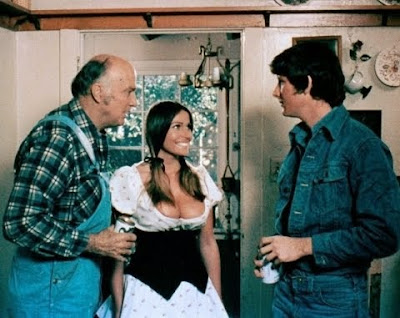Day For Night
Director Francois Truffaut was one of the most inveterate film obsessors in the history of the medium. You can read about how he, like many other future filmmakers (Kubrick among them), was a poor student. Poor not because he wasn't capable, but just disinterested. Truffaut realized early on where his heart sang. His earliest goals? To "see 3 movies a day and read 2 books a week." He spent some years as a film critic before stepping behind the camera himself.
By the time he created 1973's love poem to moviemaking, DAY FOR NIGHT, he was one of the world's most acclaimed auteurs, with SHOOT THE PIANO PLAYER and THE 400 BLOWS gracing his resume. As I watched DAY FOR NIGHT, seeing Truffaut play Ferrand, an amicable but determined director of a soapy romance called JE VOUS PRESENTE PAMELA, or MEET PAMELA, I wondered how close this performance was to his day to day. We hear him at times in voiceover, explaining that a director's job is to answer an endless stream of inquiries from the crew. You wonder if that hearing aid he wears is to discourage even more questions about which weapon to use for a key scene or what to do about a starlet who tried to keep her pregnancy a secret and is about to do a pool scene in a two-piece.
Ferrand also mirrors his real life counterpart by, in one scene, marveling over the books he has delivered to the set: biographies and assorted tomes about Hitchcock, Lubitsch, Dreyer, Godard, Bresson, and others. Is it little wonder Ferrand also has recurring dreams of being a young boy stealing posters of CITIZEN KANE from a theater?
DAY FOR NIGHT tracks several weeks of the production of MEET PAMELA, introducing us to the actors: Jacqueline Bisset is Julie Baker, whose character falls in love with her fiance's father; Valentine Cortese is Severine, the fiance's mother; Jean-Pierre Aumont is Alexandre, the father; Jean-Piere Leaud is Alphonse, the fiance. The onscreen drama is echoed by (or echoes) the on-set intrigue.
Baker had nervous breakdowns on previous pictures and an ill-advised liaison on the current film leads to another. Severine's aging screen matron hits the bottle and can't quite get her blocking right, having to repeat a scene where she opens the correct door over and over and over. She also had worked before with Alexandre, the elder hearthrob, and a recurrence of earlier real-life drama between them seems to be a whisper away. Most dramatic of all is Alphonse, an alarmingly insecure young man who falls in love at the drop of a hat. His jealousy toward script girl Liliane (Dani) becomes set legend, both enriching and endangering his performance. The art imitates life/life imitates art adage gets much mileage here.
Truffaut hits many filmic bases with DAY FOR NIGHT. The nervous insurance guys/bond holders. The uncooperative animal actors (here, a kitten who won't drink a saucer of milk on cue). He'll show us the secrets behind the use of fake snow and stunt doubles. Also, sets that aren't what they seem (such as a window on a hill that appears to be part of a house). Film has been called "the great lie" and "heightened realism". Truffaut does nothing to dispel these labels. He portrays many of the crew as those who postively live for the cinema, who do not find fulfillment in anything else. Another script girl (Nathalie Baye) explains before a fade out how she could understand giving up a man for a film, but certainly not the reverse. Ferrand will counsel his actors during their lowest points by explaining that they are people who will only find meaning in their work, on the set. Life will always be a pale imitation.
DAY FOR NIGHT, which took the Oscar for Best Foreign Film, should appeal to more than just buffs, though. Its whimsy and relational politics are in the great Truffaut tradition, maybe a bit fluffier in this movie than his others.



Comments